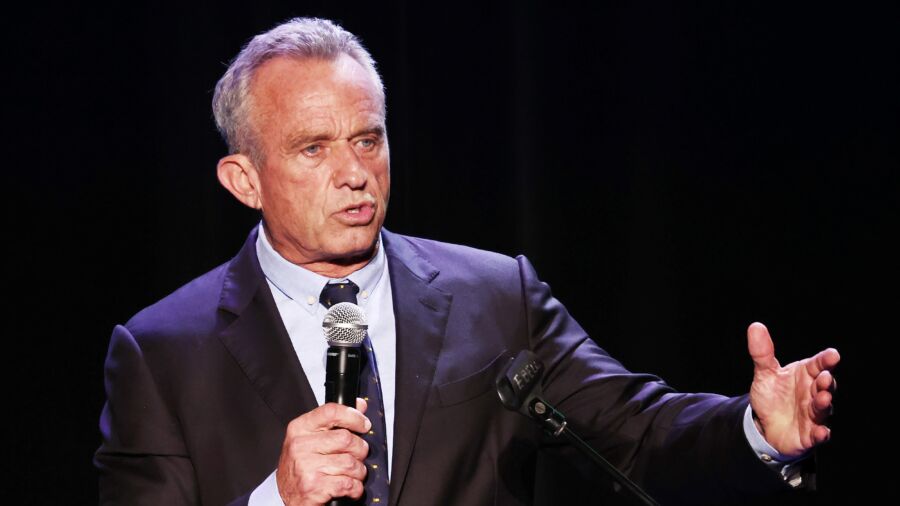Robert F. Kennedy Jr.’s campaign has clarified his opposition to fracking, saying the 2024 Democratic presidential candidate would prefer a gradual phase-out of the oil and gas extraction technology instead of a more immediate ban.
Hydraulic fracturing, or “fracking,” is a process by which powerful hydraulic pumps push fluid into underground rock formations as a means of expanding fissures that release trapped petroleum and natural gas. The fossil fuel extraction technique plays a prominent role in the production of U.S. petroleum products, which can be used for energy as well as for making plastics, artificial fertilizers, and more.
Mr. Kennedy, who has had a long career in environmental litigation, took aim at fracking last week when he announced a 10-point plan for reducing plastic pollution. In a Sept. 15 opinion article for The Hill, Mr. Kennedy presented his plan, with point 7 stating, “I will ban fracking, which provides the feedstock for most of the plastics produced in the U.S.”
Seeking to clarify those remarks, Mr. Kennedy’s campaign issued a new press statement, stating he wouldn’t pursue any specific legislation or executive action to ban fracking, but would instead remove government subsidies and liability exemptions that may be incentivizing the petroleum industry’s fracking practices. Mr. Kennedy’s team predicted that without such government incentives, fracking would become uneconomical.
“The phase-out would not come from a government ban, but from market forces that will make fracking uneconomical in the absence of subsidies,” Mr. Kennedy’s campaign said in an emailed press statement to NTD News. “Frackers will be made liable for the environmental costs of groundwater contamination and other health risks.”
However, Mr. Kennedy’s team predicted that such moves would not bring about an overnight end to fracking. “It is anticipated that existing fracking fields with a lot of sunk costs will continue to operate for quite some time,” the statement reads.
Oil industry commentators are likely to disagree with the Kennedy team’s assessment, however.
A report from the American Petroleum Institute (API), citing Department of Energy data from 2018, estimates that around 95 percent of new wells drilled to produce fossil fuels in the United States employ fracking techniques. The API report further estimates that these wells account for about two-thirds of U.S.-marketed natural gas production, and about half of U.S. crude oil production. The API contends that fracking projects have contributed to growth in other areas of the economy as well, providing “an array of benefits” to the economy and American households.
Following Mr. Kennedy’s prior comments about a “ban” on fracking, energy policy researcher Alex Epstein also warned that a ban could harm the economy. Mr. Epstein criticized talk of a ban, and questioned the effectiveness of stopping fracking as a means of combatting plastic pollution.
“Banning fracking would immediately plunge the US into a depression. And [Robert Kennedy Jr.] would do it to ‘solve’ an amorphous ‘plastics crisis,'” Mr. Epstein wrote in a post on the X social media platform on Sept. 16.
Fracking Policy in the Democratic Presidential Primary
It remains to be seen whether Mr. Kennedy will become the Democratic Party’s presidential candidate, and whether his position on fracking will be developed further.
Mr. Kennedy currently trails the Democratic Party incumbent, President Joe Biden, by about 55 points across the RealClearPolitics average of polls for the party’s 2024 primary.
In his opinion article for The Hill, Mr. Kennedy claimed that President Biden “has focused on false environmental solutions that waste billions of taxpayer dollars.” Mr. Kennedy further accused President Biden of, at times, “kowtowing to big polluters.”
President Biden’s administration has offered some mixed positions on fracking and the fossil fuel industry in general.
When asked during a July 2019 Democratic primary debate whether there would be any place for fossil fuels—including coal and fracked oil and gas—in his administration, then-candidate Joe Biden replied, “No, we would … work it out. We would make sure it’s eliminated and no more subsidies for either one of those, either—any fossil fuel.”
In a March 2020 Democratic primary debate, Sen. Bernie Sanders (I-Vt.) alleged that then-candidate Biden would continue to allow fracking as president, prompting Biden to respond “No more, no new fracking.” President Biden’s 2020 campaign team later clarified that his “no new fracking” comment was in regards to new fossil fuel drilling permits on federal land.
Earlier this year, however, the Biden administration approved a scaled-down proposal for a new oil project on federal land in Alaska. The decision prompted PolitiFact to conclude that President Biden had fully reversed on his commitment to refuse new fossil fuel drilling on federal land. President Biden was also the subject of criticism from his left flank, with environmental groups and some Democratic lawmakers criticizing the Alaska oil project.
From NTD News.


